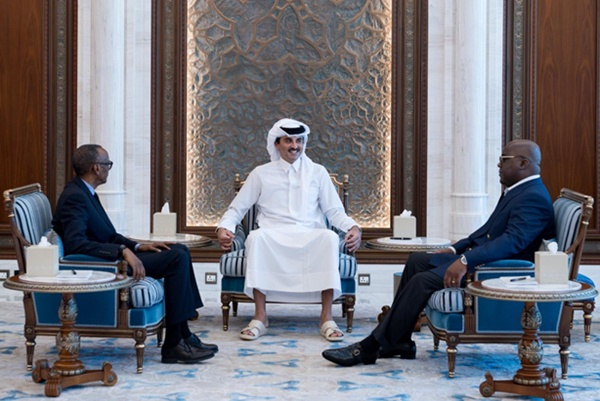After failing to meet several times over the past months, Presidents Félix Tshisekedi of the Democratic Republic of Congo (DRC) and Paul Kagame of Rwanda finally sat face-to-face on March 18, 2025, in Doha, Qatar. The meeting, mediated by Emir Sheikh Tamim bin Hamad Al Thani, marked a significant diplomatic breakthrough toward resolving the escalating conflict in eastern DRC.
According to a joint communiqué issued after the talks, “the Heads of State reaffirmed the commitment of all parties to an immediate and unconditional ceasefire,” referencing agreements made at the February summit of the East African Community (EAC) and Southern African Development Community (SADC) leaders in Dar es Salaam. A week after the summit, the M3 rebels and their Rwandan allies captured Bukavu.
The communiqué also emphasized continuing discussions under the Luanda/Nairobi peace process to establish lasting foundations for peace. It described the Doha meeting as contributing to “a shared commitment to a secure and stable future for the Democratic Republic of Congo and the region.”
This meeting brought fresh hope following the abrupt cancellation of peace talks in Angola scheduled for the same day. The withdrawal of M23 rebels from those negotiations, citing European Union sanctions imposed on their leaders on March 17, further undermined efforts to resolve the conflict. Tshisekedi and Kagame had not met since February 2024 at an African Union summit, and previous attempts at dialogue—including a planned December summit in Luanda—had collapsed.
The Emir of Qatar played a crucial role in bringing the two leaders together. According to Congolese presidential spokeswoman Tina Salama, Qatar is viewed as a “strategic ally” by both nations. This mediation effort underscores Qatar’s growing influence as a neutral facilitator in complex geopolitical disputes.
The stakes are high for eastern DRC, a mineral-rich region that M23 started invading in January, seizing key cities like Goma and Bukavu and causing widespread displacement. The conflict has claimed an estimated 7,000 lives this year alone. Accusations that Rwanda supports M23—backed by United Nations reports—have strained regional relations, with Kigali denying any direct involvement.
This article was initially published in French by Pierre Mukoko
Edited in English by Ola Schad Akinocho










